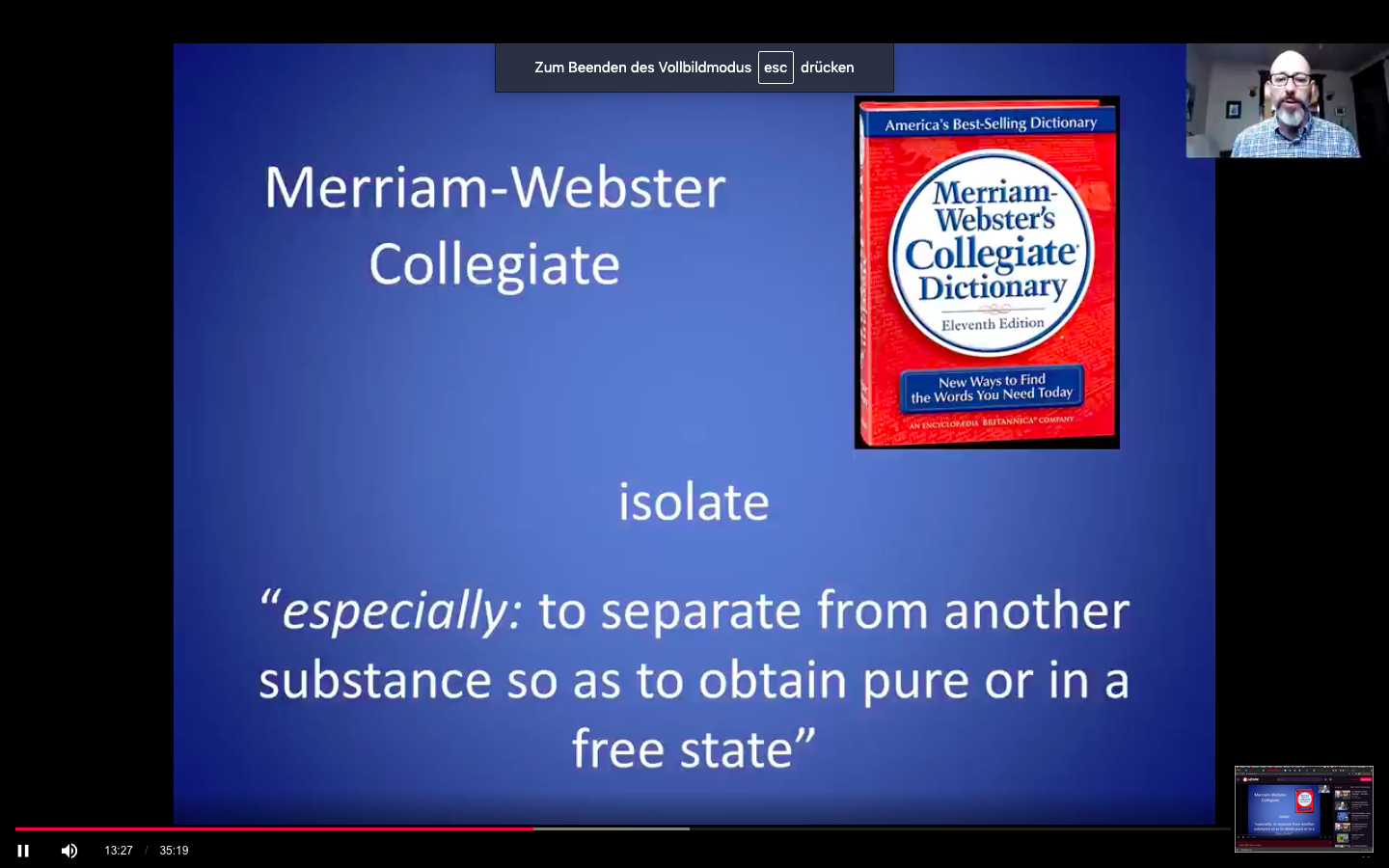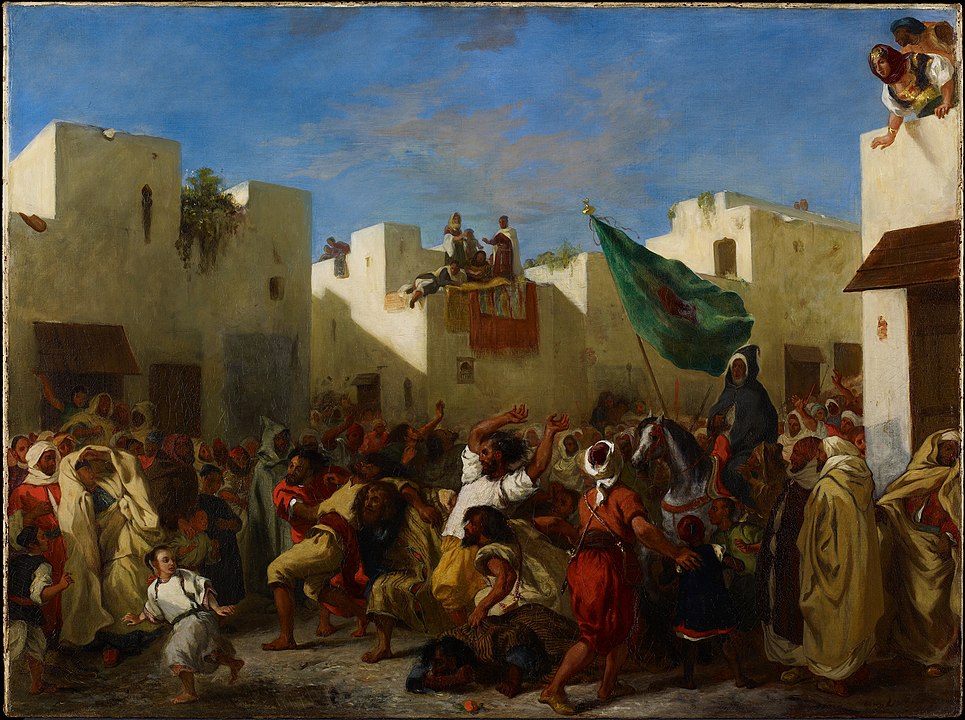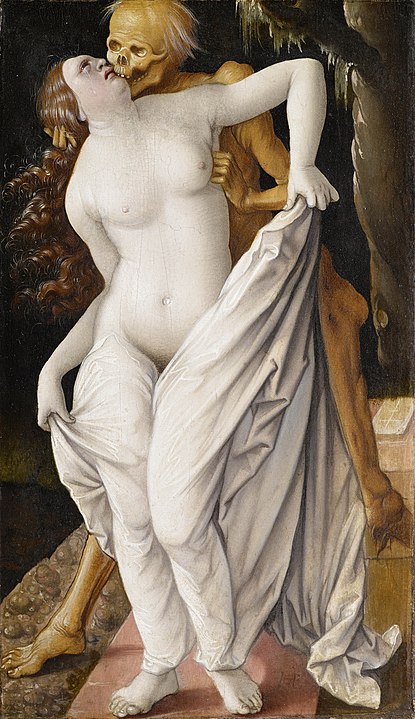What fills the gap if you don't believe in the contagion theory?

Personally, I think the problem we create as humans at the moment is
the belief in "contagion".
It's not so much the belief itself but what consequences have taken place in this matter.
Where does this perspective come from, where does this world view come from that one is the enemy of the other?
The virus theory pays heavily into this picture. "Contagion", that is a deeply rooted belief and widespread even among opponents of the current global measures. It is a damaging view of humanity, it really does no one any good to think this way.
The language of this contagion theory, it always reminds me of war language, of enemy thinking and also of institutional language through religiously fanatical statements. Man stands here in the light of decay, he is a badge, a carrier of something evil.
Does it make sense to regard human beings, all living beings in general, as carriers of the bad, the ultimate harmful?
I derive this worldview from a very old worldview that seems to recur regularly. Where once the institutions of the church set out to establish the sexual act between humans as dirty and repulsive, this seems to have been a complete success that has survived into modern times.
The words are different, but the meaning is the same.
To recognise pleasurable experience through pleasurable physical contact, the resulting exchange of bodily fluids, everything that is associated with it as disgusting and unhealthy, that to me is an expression of self-loathing.

Man as a sex offender, as an animalistic being who cannot control himself. French kisses, vaginal fluids, semen, sweat and so on are all branded as dangerous in the course of a fanatical hygienism. Shaking hands, hugging, being close, now it has reached the ultimate peak, the wanting of a disembodied existence where everything that is body is to be demonised.
For me, it seems obvious to draw this connection between the historically grown rejection of the corporeal - which though always shrunk by rebelling counter-forces - and what is happening now.
What if one were to disregard the contagion theory?
What if one did not use it to explain the illness "infection"? How would one have to think then? What explanations would be worth considering for what we understand by "infectious disease"?
What does our body actually do during a so-called infection?
It produces mucus. On the one hand, we get rid of this through the nose and call it snot. And we get rid of it by coughing it up and call that a cough.
Isn't it obvious that sniffling and coughing up is a necessary process because the body is trying to rid itself of (used up/unusable) substances? Why else would this process occur automatically if it is not a matter of releasing substances from the body? Should something like this be suppressed? Why?
That would be like saying that the daily trip to the toilet should be suppressed.
The excretion of substances from the body through the anus is a natural process that should not be disturbed or prevented by anything. These substances are simply no longer needed because our body has previously metabolised them. Whether it is the lungs, the frontal sinus, i.e. the mouth opening or the nasal opening, the ears or even the glands of our eyes, the body strives to flush things out and this is completely normal and natural.
So what is the difference between what the intestine carries out of the body and what our lungs, nose, ears or eyes carry out?
I don't see any significant difference here, except that it's inflow and respiration on the one hand and digestion on the other. Every orifice of the body has its purpose, so also the sweat glands of the skin.
We humans are permeable beings, things come into us and come out of us again. Now to demand that such things should not be allowed in the first place is an insane and completely senseless, a harmful idea.
But that's what we do right now: We prevent ourselves from having snot and coughs and fever.
To put it bluntly: suppressing flu and colds would be just like trying to ban pooping.
Or sweating.

Now, this "preventing" may work for a while. But what will be the result of not wanting to let the bodily dynamics happen? Is it possible, even probable, that the organs then will store those materials? But eventually this suppression of getting dis-eased once in a while may have more harmful effects, would it not?
What is generally disregarded as a pathogen does not at all arouse the disease itself, but attracts attention, by means of symptoms, to an already existing imbalance. Therefore, destroying the messenger of a message, rather than placing the message itself in the context of what is currently happening, and thus in the history that led to the imbalance, continues to lead to longer-term problems.
source: https://guidovobig.com/2020/04/24/gedanken-rund-um-das-was-ist-und-kommen-wird/
I would simply say that our body creates a balance between what it takes in and what it gives out, which is more neutral in expression.
Shedding fluids
Where the body has to expend more energy to use the orifices of the body to the greatest effect, it feverishes, for example. Fever leads to sweating, which is again a way of getting rid of a substance through the skin.
Sweating is, after all, the actual process of fever. The body's own generation of heat - and that in a state of rest (!) - seems to me to be a very interesting phenomenon. Something I have an interest in and a great deal of wonder about. About this very miracle of nature. Depending on how quickly something that has entered the body through (polluted) air and water, for example, or (spoiled) food, is supposed to get out again, our body uses different speeds. We get diarrhoea when things have to happen quickly. Normal bowel movements take place when nothing needs to be accelerated.
But what does "polluted" air or "spoiled food" mean?
People like to blame micro-organisms here, as if they were the cause. I would say, however, that it is always the dose, i.e. the amount of what our very individually grown bodies are able to metabolise. But couldn't we say that the presence and interaction of microbes as a whole - as a microbiome - go through different states of aggregation/motion, just like we do? Isn't the environment also making a difference, the sphere in which we move, from the smallest to the biggest influences? (Even emotions?!)
So if I personally get the sniffs, for example, from dust or dryness in the air and whatever other micro-stuff is in it, it will eventually give me an inflammation, depending on how else I am able to get rid of substances. How else is important here. I may get no problems with dust-stuffed or very dry air when the rest of my metabolism is able to interact well: Digestion is fine, I shed a good amount of sweat and I may also have a satisfying sex life. I drink enough water, I eat well. I laugh, I move myself, I relax.
Holobiont
I think it's the interplay of all of it, my whole organism - an interplay - also with the microbes, whom I see as the helpers helper to transform what food I eat and what fluids I drink and what air I breathe. I am their tree of life in the same way they are my little inhabitants which help me to live.
Why treat them as the evil messengers whom we have to kill or control? We call them "viruses" or "bacteria". Why this hostility and why those associations with warlike creatures? We humanize those creatures and give them humanly associations like "perpetrators", "soldiers", "defenders", "army" etc. Or, we associate it with "garbage" in a negative way. Garbage in a dirty meaning, an ugly sight, bad smells, bad tastes.
Even "immunity-system" seems to be something warlike. It "fights" the aggressors, it "kills", it "destroys" the "invaders". The "corona virus" has "spikes" instead of "knobs" as one also could say.
I don't think that way. I think it's harmful to have this kind of thinking.
"A different approach":
In the reality of the body and its dynamics, there is no room for the assumption of a malignant effect. All processes that take place, including those that can lead to disease, suffering, pain and death, are meaningful from the point of view of their origin. A different approach to the virus phenomenon is also possible and necessary: If you read scientific publications on viruses that cause disease, any layperson with a little background knowledge will recognise that no virus appears in them, but typical components and properties of cells.
On the apparent detection of disease-causing viruses
In contrast to the "phages", correctly described as incomplete minispores and building blocks of bacteria, the disease-causing viruses suspected in humans and animals have not yet been seen in humans, animals or their body fluids, nor have they been isolated from them like phages and therefore have not been biochemically characterised. To this day, none of the people involved has noticed this. Without realising that the suspected disease-causing viruses had not been seen in any human or animal and isolated from them, because the use of the electron microscope and biochemistry only slowly became the norm after 1945, from 1949 onwards the same idea was applied to human and animal viruses as to phages in order to supposedly propagate them.
source: https://gandhi-auftrag.de/Wissenschafftplus_Viren_entwirren.pdf (translated from German)
Anyway, my expression here is not primarily a scientifically guided way of thinking. My point is that even if it were claimed that the theory of contagion had been proven beyond doubt, I would still not be prepared to believe it. Especially since theories are always in a constant process of change due to counter-theories that question them or change them. Just as one always thought that genes were something fixed and that they would not change, one already thinks differently.
What one derives from the contagion theory, what one has made of this idea, leads me to believe that it is nonsense to continue to hold on to it.
I actually started to stay away from hugs and kisses myself, when I thought I was getting flu or had a cold, I would say to my man: "oh, better not kiss and hug." But after all those events from the last year we hug each other and are close, even, and especially, when we feel unwell. It's as if we now want to test out this theory ourselves.
But why do so many people get sick all at once?
How can it be that children in the places of care often get "sick" at the same time? How can it be that you see the animals in the barn getting sick at the same time?
Yes, why? But how does one know such things? Have any of you ever experienced that everyone in a family suffered from "infections" at the same time? Not me. It was always one person who fell ill while the others remained healthy.
Has an entire class ever been absent from school at once? Ever an entire workforce at work? I have never experienced anything like that. Individuals always fell ill, one more, the other less. No one from my circle has ever died of influenza. Everyone recovered and said they had experienced headaches and aching limbs, fever, a strenuous cough or a really bad sinus infection.
But what exactly triggers such things remains unclear in the end. I think that several factors always play a role in illness.
Human interpretation and language is, in my view, the main reason for all the malaise.
While we humanise everything around us, even machines, we seem to dehumanise ourselves, like objects.
The cult we are currently experiencing is a return of all previous cults based on adversarialism.

The eternal inner-human conflict, the heaviness of existence. Not much really seems to have changed in the desire to be redeemed and saved from the evil of existence. But redemption is fantasy. The present cult seems to me to be a death cult. Driven by self-hatred.
The volunteers who still submit to every absurd order and are fearful and obedient in advance, they strike me as not really wanting to be alive. As if they were only interested in remaining in their lifeless bubble of everyday banalities. Where you don't really need to make an effort for anything, where everything is conveniently delivered to you. Ready made.
In fact, it is a tremendous feat of emotion to imagine that the comforts provided are being delivered on the backs of the many others whom we never see, whom we will never know.
The exploitation of whole peoples who are enslaved so that we can be comfortable here. This is an enormous debt that is being built up. I can imagine that something is going on depth-psychologically, that the very punishment that one actually believes one deserves is now experiencing its expression in the form of the Corona cult.
A friend once suggested to me that she would not voluntarily give up her privileges and her stupidities, but had to be forced to do so.
I thought she was completely crazy when she said that. She gave herself a certificate of patheticness and at the same time showed how little she thinks of her fellow human beings. Since she herself admitted her recklessness, this seemed to be legitimacy enough for her to equally punish the recklessness of others.
Thus, she was also a person who regretted the joy she experienced, every fun that got out of hand, at the drop of a hat. The frivolities or excesses that we certainly experienced together, she condemned afterwards. The bad conscience after a night of partying, the morning hangover, the sluggishness, she must have experienced all that as perverse hedonism, as bad laziness, as something sinful.
But when I asked her about her religious indoctrination,
she vehemently denied it, otherwise she would have become a very God-fearing person, wouldn't she? Instead, she said that she was the opposite, whereas she often enough ridiculed or despised devout Christians.
... I thought: "Oh, yeah? What's the difference? Just because you exclude the literal interpretation of a god for yourself, you nevertheless include everything that was connected with it. I see it, I feel it in your contempt for flippancy and gaiety and spontaneity."
I have seen her in her moments when she had given up strict control over herself, when she really didn't care about anything. Where her strict controller let go of the reins, she did it all the more extravagantly. But as soon as sobriety and the day returned, it reappeared, the regret, the caution, the insecurity, the tightness. And with it, her envy of those who were able to maintain this cheerfulness even when sober, who didn't think three times about simply letting themselves fall into a situation. It's as if she was thinking how selfish and self-centred this form of easy living was.
For me, she is a synonym for what is going on with many people. Guilt and regret over the pleasures of life enjoyed.
But eternally entangled in it. The willingness to reduce some of this lifestyle, to give something up, I never saw that in her. She really likes to live large. But actually she was never untruthful in that respect. Her interest in me, maybe she only had it for the reason that those who resemble her do begin to bore her after a while.

Another friend said to me last year, meaningfully, that "we are now reaping what we have sown."
For him, the virus was the expression of our spiteful way of life, the mistakes we had made and everything sounded to me as if we were now experiencing the just punishment for it. Again I thought: "How can such erroneous beliefs have taken root?" Someone I had always thought was reasonable was indulging in religiously tinged indoctrination.
Not even attempting to speak out, not making any effort to shed conformism, to dare to say something, all this testifies to how bad our image of humanity is. Yes, indeed, it is a hard experience to be excluded from the community, a community that is quick to adopt a hardline position. The contradictions irritate me anew every time.
The misconceived solidarity of "we fight together against the virus",
a direct attack against the human being itself, because how can you fight against a virus at the same time and not fight against human beings? To declare war on the virus and not realise that it is a war against oneself, how is such a thing possible? Such a thing is of course not communal, but something un-communal. It's unspiritual as well.
For a year now, I have always heard the answer that I am "alone" with my objections, that I am representing a "single opinion". I am a minority. That's interesting, no?
As if being a minority is a fixed state of being.
It's not. Those telling me, I am a minority could easily join me. By their will. And apart from that, "being minority" is not an argument at all.
Such minds use this as the end of the debate, having already decided to follow an imagined majority, of which no existing fixation need be assumed at any point. Unless one wants it that way.

Especially at the beginning of an unpredictable development, to claim that one is alone with an attitude is the much-invoked anticipatory obedience. Purely on the basis of a message conjured up by the media as reality.
I had an argument with the parents' representative of my son's class and the two teachers in mid-May last year.
The PTA immediately had the bogus argument that I was merely expressing my individual opinion and the teachers accused me of " abusing them as a communication interface".
Not realising that they have already fallen prey to abuse from higher up and having given oneself up as communicators for a government course, having presumably smelt that it could end badly for one if one spreads anything other than the danger narrative. The ridiculousness in the claim that I, as an individual mother, was misusing the school's channels for my own agenda did not occur to me until it was brought to my attention.
I think that all these accusations of being a "murderer"
if you don't follow the Corona rules, of being right-wing, of being a Nazi, of being an unsolidaric person, all these moral labels, to me they point exactly in the direction of the person who wants to blame others for the guilt he feels for himself.
The unconscious misdeeds and omissions of ones own past, that is the guilt-ridden person who never cared that "so many people had to die from so many diseases." He sees this as an omission. The many deaths from influenza that we hear about all the time now, and where the question is asked why we didn't care before, misses an important addition: that we naturally don't need to worry about it.
It is an impossibility to make all sick people healthy and to avoid all deaths.
This impossibility, however, is what those who feel guilty about their previous ease of living and their ignorance, now to be ostracised, seem to have set as their goal.
One could just as well go and be horrified that so many people endanger themselves and die by their very existence. What's the point?
Why all of a sudden all billion people are supposed to think equally for all billion people is something that no one can explain with reason. Those who think this way have docked themselves to those who have actually fallen prey to the madness of making the whole world orderly by means of theoretical models.
There is nothing "generally to prevent". There is no "society" to model. It does not exist. It is a myth, a mental delusion.
To finish this text, I nevertheless use science as my backup.
This is an excerpt from a scientific paper published by the Max Planck Institute in 1999 / MAX- PLANCK- INSTITUTE FOR SCIENTIFIC HISTORY:
The history of virus research in the 20th century is usually portrayed as a continuous process, as a history of progressive revelation of virus nature (see Waterson 1978: xii; Hughes 1977: 75 ff.; for a critique of this concept see van Helvoort 1994a:187).
However, our analysis of the case study material has revealed some things that lead away from such a view of history. In particular, it was shown that the refinement and expansion of experimental means and procedures, which is generally seen as a guarantee for uninterrupted progress in the knowledge of nature, had rather led to setbacks in the period under consideration (for example, in the development of virus classification) and had deepened the gap between the contending parties in virus research.
With the "filterable" virus, something had been discovered of which, according to the concepts handed down, which had after all mostly proven themselves in the research of infectious diseases, no picture could be formed which all researchers could have shared.
Very different interpretations of the nature of this phenomenon emerged and were put forward against each other. No experimental proof for this or that concept, which all researchers would have had to recognise, could be presented by either side.
This means that the decision as to whether this or that explanation most accurately expresses the "true" nature of the virus could not be "objectified" empirically.
Page 57 ff recommended reading (language: German). Source: https://www.mpiwg-berlin.mpg.de/Preprints/P125.PDF
My title: "What fills the gap if you don't believe in the contagion theory?"
still does not answer its question. It need not do that. I already made up my mind and heart from the beginning. I fill the text with what I personally think and thought and do what everyone does who holds a world-view. Searching for arguments which fit what I already think. But don't misunderstand me. The way I thought, it changed in the course of my life. Several times. It's nothing fixed.

Picture sources:
Von Eugène Delacroix - 1. Web Gallery of Art: Abbild Info about artwork2. [1], Gemeinfrei, https://commons.wikimedia.org/w/index.php?curid=15452861
Von Infrogmation of New Orleans - Photo by Infrogmation, CC BY-SA 3.0, https://commons.wikimedia.org/w/index.php?curid=4636269
Von Originally from de.wikipedia; description page is (was) here21:20, 19. Nov 2004 Captain Blood 1034 x 979 (302.021 Byte)20:30, 19. Nov 2004 Captain Blood 1036 x 1017 (418.878 Byte)User Captain Blood on de.wikipedia, Commons upload by Profoss 23:18, 23 May 2006 (UTC), Gemeinfrei, https://commons.wikimedia.org/w/index.php?curid=805774
By Henryk Siemiradzki - http://fotki.yandex.ru/users/hds-shah/view/187521/?page=6, Public Domain, https://commons.wikimedia.org/w/index.php?curid=9462693
Gemeinfrei, https://commons.wikimedia.org/w/index.php?curid=186642
Von Hans Baldung - The Yorck Project (2002) 10.000 Meisterwerke der Malerei (DVD-ROM), distributed by DIRECTMEDIA Publishing GmbH. ISBN: 3936122202., Gemeinfrei, https://commons.wikimedia.org/w/index.php?curid=147730
Stefan Lanka from Germany does a superb article on where it all went wrong, germ theory that is here https://thefreedomarticles.com/dr-stefan-lanka-2020-article-reveals-virus-misconception/
Yes, I already dug into his publications. I'll look up what you linked.
Not much going on here on hive.
POB is where it's at. (proofofbrain.io) :-)
Thank you. You are one of the most consistent communicating person of this hoax.
I am also hanging in there.
Greetings to you.
Thank you--right back at cha.
:-)
Right. You really do made up your mind and heart. Thanks for the food for thought. I actually haven't spent much time thinking about it. But overall I can agree with you. You say some interesting and thoughtful things. Unfortunately, I don't have much to add.
I actually look skeptically at everything that the mainstream wants to impose as truth.
Interesting publication, best regards!
P.S. You wrote the Information War tag with "m".
Thank you.
About what specifically?
I have touched many topics in this text. In particular, this one busies my mind. I put a comment in here, which I left somewhere else:
The question and also the threat that the vaccination disciples ask and express is therefore not uninteresting for self-reflection. These disciples attribute a "guilt" to "disease": Now not only their own "guilt", but also the "guilt of others".
To associate the question of guilt with illness therefore points to a way of life that is understood as shameful, that is described as light-footed and hedonistic, a kind of "after me, the deluge" attitude. You can see how smokers, drinkers and eaters are getting the jingle bells right now. Add to that those who actually still have sex, and we seem to be swinging back into an age of prudishness and self-mortification.
From my life experience, I know that it's the worse representatives who often switch to the fanatical, who have enjoyed themselves particularly often and gladly, or who have had a particularly "great time" and afterwards, after a binge, after an eating binge and giving themselves up and letting themselves fall into a fun society, feel particularly guilty. What they did before, they demonised all the more afterwards. In this context, guilt and shame are the poison that seeks to suppress the living and therefore expresses itself all the more strongly in (condemned) excess.
The Corona disciples practise hypocritical ruthlessness, which becomes obvious by the fact that they do not want to renounce the pleasures of life under any circumstances, because they have still tasted too little of them. Hence the statement that one gets vaccinated in order to be able to travel again. I think people also want it in order to be able to drink, smoke and eat excessively in company again without ever admitting to the greed for it.
Personally, I have nothing against drinking, eating, smoking.
Right. You always touch on many topics in your writings, and that's why they tend to be thought provoking. I was referring specifically to the contagion theory.
The way I see it, I think people who find themselves caught in that unhealthy swing of opposite extremes carry with them a contradiction between who they are consciously trying to be, and what they "need" to be on an unconscious level. These excesses can be a form of balance. If someone does not have a very pleasurable life, he will look for excessive pleasures.
But I don't think guilt and shame are necessarily a bad thing, they are necessary to some degree, just not in such an excessive way.
To me, you have put that well and to the point. It is what I meant. However, I see it as a failed attempt at balance because it is in a negative field of tension. So only two ends are addressed. If one expands the field, perhaps the following would result.
"Pleasure" or "feeling pleasure" is first of all a human peculiarity. If I exaggerate this pleasure, I find myself back on the underlying point of frivolity or "decadence".
But what could be the sister quality of joy/pleasure?
One could cite "seriousness" or "profundity" here. So that there is a positive field here between these two sensations: The lightness on the one hand, the profundity on the other. Now, if you overdo it with seriousness, if you overstretch the arc of such seriousness, you end up at the point of humourlessness, a joylessness. This is the negative sister quality of decadence/frivolity.
Who has not experienced a phase in which one was caught between these two negative qualities? It is difficult and extremely exhausting to live between humourlessness and frivolity. Decadence has a certain tiring boredom, in which there is no longer any real joy in the good and the beautiful and the true, because there is too much of it. Pleasure falls by the wayside.
That is why I treat it as a faulty balance, because it moves in an unpleasant field of tension from which one can only get out if one learns to find the way back between humor and profundity.
Agree.
hmmm... I don't agree with that in terms of my definition.
I do not equate guilt and shame with responsibility, if that was what you meant?
Let me explain myself:
Rather, a feeling of guilt for me is the rejection of seeking answers. Those who say "I am to blame for someone else being miserable" are bypassing responsibility (because in fact, following this logic, they must also blame others for being miserable themselves). For if I take it literally that feeling responsible means recognising one's own limits, the limits of what I attribute to myself and my actions and omissions, it tends to lead me to recognise the limitation to which I am inevitably subject. Feeling guilty in this respect is a weakness of character, an over-emphasis on one's own importance.
Whoever says, "I am to blame for the fact that you have become ill, an alcoholic, a drug addict, poor or even ill with a "virus", is thereby artificially overstating oneself. Such an exaggeration of what one blames oneself for can lead to the transfer of the personal experience of an inadequacy from those directly affected to "the many". Ergo, to the large communities, ergo to the whole world.
For those who are trapped in guilt, an acquittal will be of no use if they do not set out to free themselves from this guilt.
I prefer to leave the term "guilt" in its negatively perceived meaning and contrast it with the positive term "responsibility". From my personal perception, I experience people driven by feelings of guilt as being overly interested in fulfilling their duties, in exhausting themselves mentally as well as physically, in order to reduce this guilt that they believe they have to work off. The damage done by such personalities is difficult to measure, but it is perceptible. From this feeds the current do-gooderism, an over-fulfilment of a moral inferiority complex.
However, insofar as guilt and shame are accepted as effective correctors between people in the field of this energy, one could assume that these feelings lead to the improvement of human relationships. Someone who believes in the necessary moral judgement established by guilt may accept this judgement as just. And he may take those who do not believe such as stupid, weak and soft.
... But if we observe that in the history of the past and the present, guilt has never really been admitted by the perpetrator of an evil deed, and especially in the field of politics, these admissions of guilt do not take place; rather, people seem to be aware of no guilt at all, and if they are, then the usual mechanisms of suppression and distraction are at work. If someone is then convicted, he only admits his guilt under the duress of a public condemnation. But here the dimension and the strength of the denial of responsibility becomes apparent.
In this energetic field of circulating irresponsibility, there are the players who can no longer be addressed because they keep their names and addresses secret. At the end of an era of extreme suffering, no one wants to have been the one who denied responsibility. History then covers up such things and the reappraisal of what happened gets lost in it. Until the next event.
... I could say a lot more but I leave it here.
I would appreciate your view on this.
Yes, I agree with virtually everything you have said, however, I can't help but think that when a person hurts another person whom that person did not mean to hurt, then he or she will feel guilt and the feeling of guilt will not be negative in that particular case. Maybe I am overlooking something.
Quite true.
I agree that guilt and responsibility are not the same thing. Many times we have to take responsibility even for things for which we are not to blame.
:) I truly appreciate your loquacity and talkativeness.
argh...thank you. I cannot correct the tags through the editor - doesn't work.
@informationwar :)
so cool you mention lanka's work. there is also the magnificent compilation of doctors in the past decades raving about the lunacy of the so-called hiv virus. this topic is nothing new at all.
when lanka is asked the question as to what actually causes disease if it is not a pathogenic virus he answers that we explain like it has been explained before the virus hypothesis came up - namely poisoning from the inside or outside, as well as psychosomatic effects that materialize in the body as a way of healing and overcoming the defect.
all the best to ya <3
Thank you so much to forward me those videos. I just watched the first one - really impressive the speech of that doctor. He deserves his professional title. Do you know, if this can be also watched on oddysee or another platform? I have no technical knowledge how to download this video and place it where it is more save not to be censored.
I will now watch the second one. I first stumbled over Lanka when we faced mandatory measles vaccination in the beginning of last year. I was all worried about this and started my research. And then corina came.
Thanks again for giving me this material, I really appreciate it.
Greetings <3
you are so welcome!
the original lanka interview is largely not available anymore on yt but this dub seems to have spread far and wide!
Here is the book I downloaded - from Dr. Willner, the last speaker in that video:
https://ia801708.us.archive.org/2/items/deadly-deception-robert-willner/Deadly%20Deception%20-%20Robert%20Willner.pdf
And here is the book from T. C. Fry, another scientist who was also interviewed:
https://img1.wsimg.com/blobby/go/542b75dd-6da5-4a25-aef0-a2c975d37754/The%20Great%20AIDS%20Hoax%201%20of%206.pdf
So many similarities between now and then, it's almost unbearable.
This was very thought-provoking, I love it!
:) Thank you.